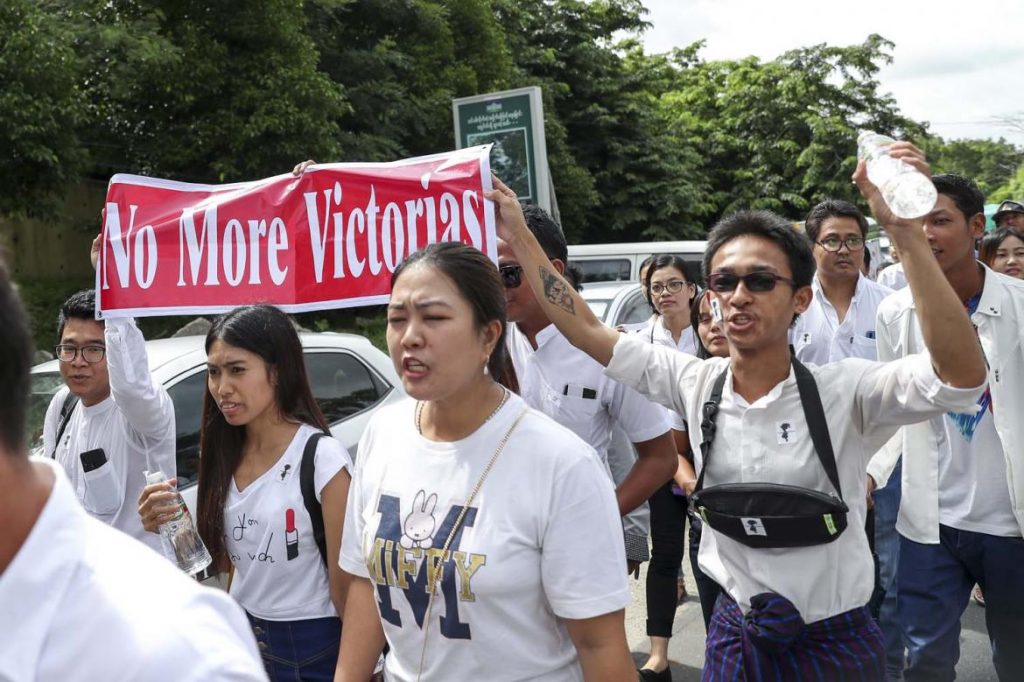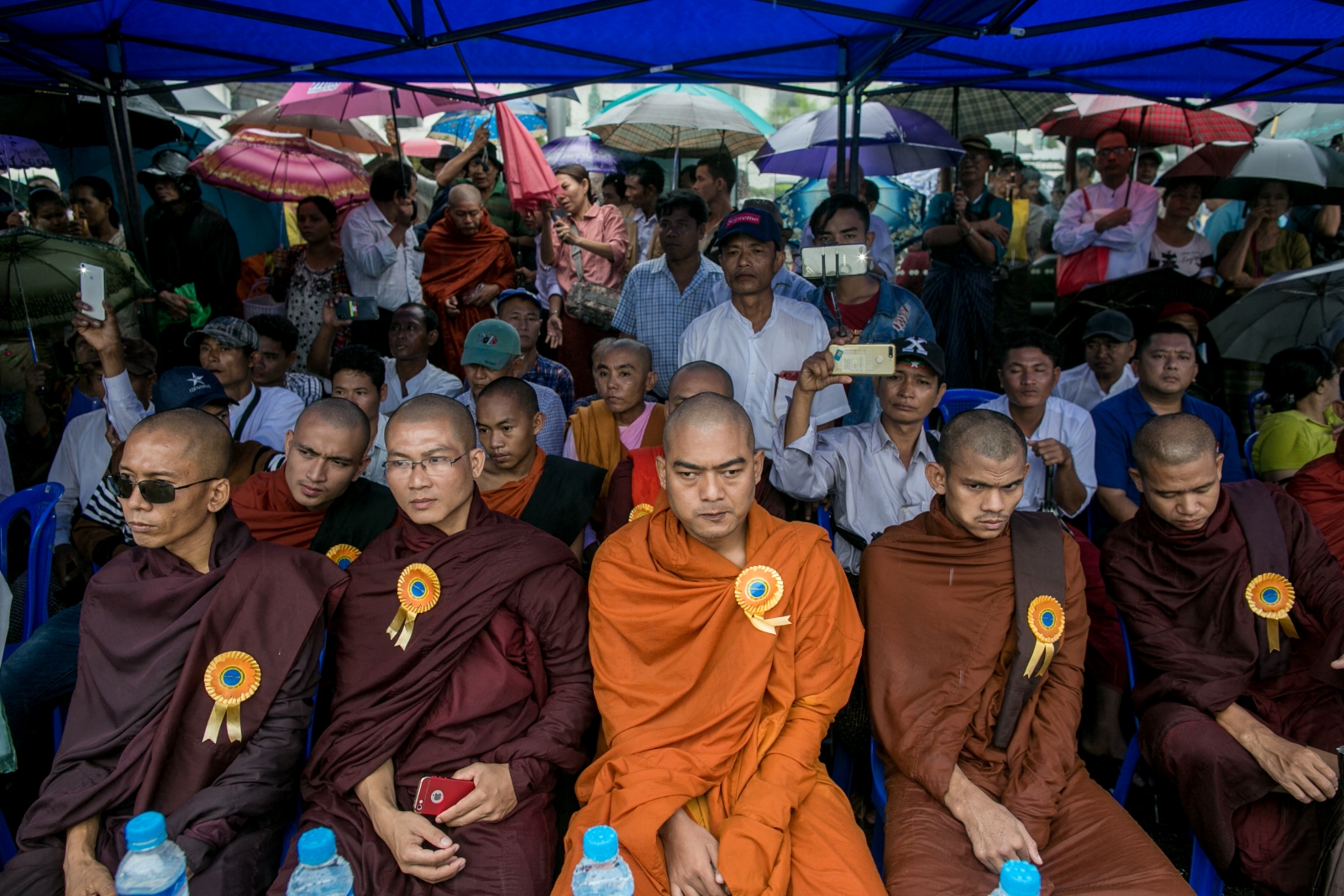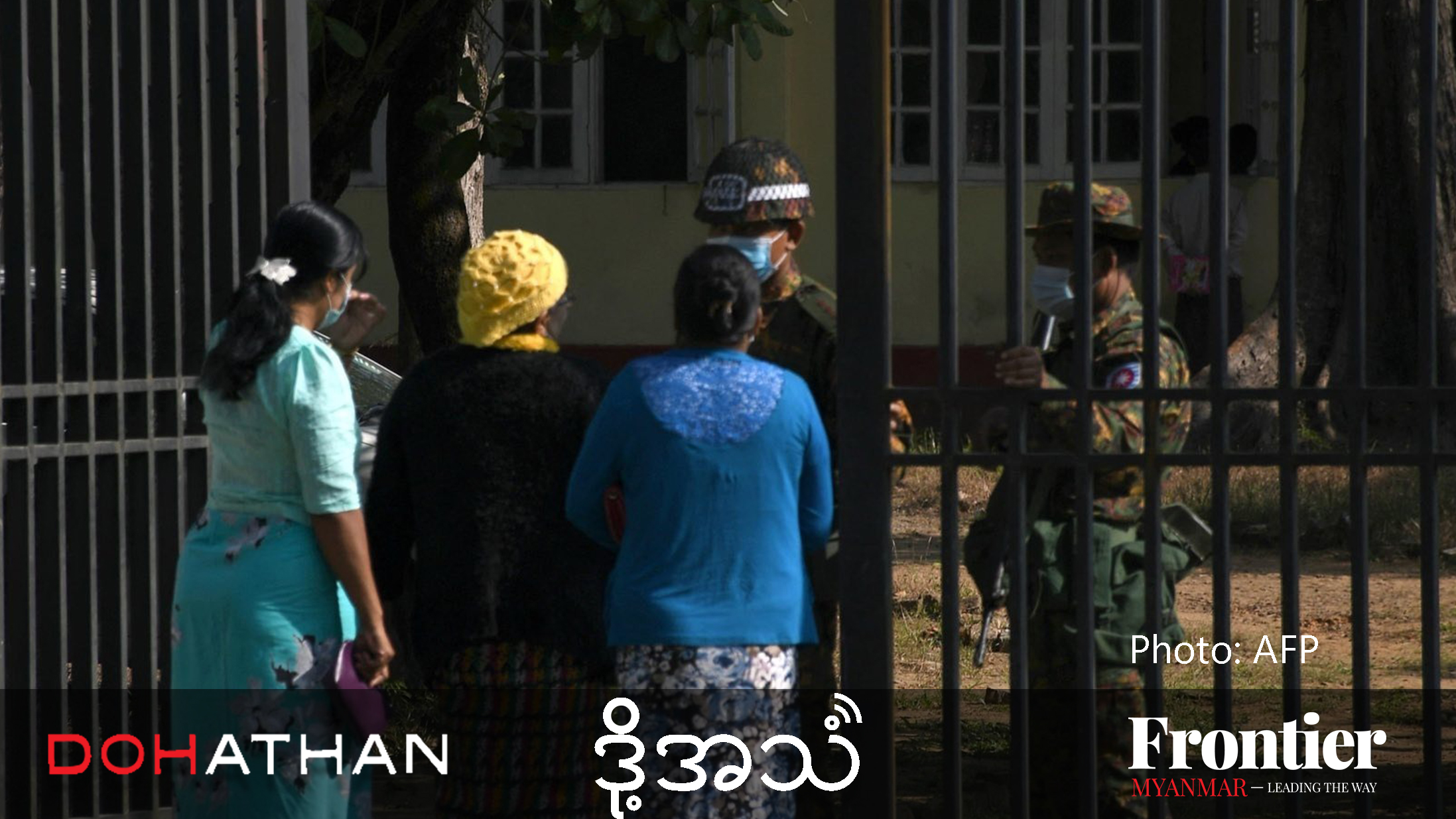A controversial organisation that runs monastic schools and orphanages across Myanmar is back in the spotlight after allegedly trying to cover up the rape of a five-year-old girl at one of its centres.
By FRONTIER
For more than four years, Ma San Yunn Nadi had donated to an orphanage in Ayeyarwady Region, half a day’s drive from where she lives in Yangon. The institution in Thabaung Township is run by an organisation called Yellow Generation Wave, which has orphanages and schools in Buddhist monasteries across the country.
Besides monetary support, she would sometimes spend an afternoon with the orphans. One of those children, a five-year-old named Jasmine*, arrived at the orphanage as a two-month-old infant with her older sister from Shan State. Her father died of a snake bite before Jasmine was born, and her mother died of an illness soon after childbirth.
“Jasmine is so sweet. Everybody from the school and a lot of the donors love her,” San Yunn Nadi told Frontier.
But in May, the girls shared some disturbing news. They claimed Ko Ah Lone, a 20-year-old worker at the orphanage, had repeatedly raped Jasmine.
“When I heard this, I was heartbroken,” San Yunn Nadi said.
What’s more, when Jasmine and her sister initially reported the incident to a monk, they claim he then touched Jasmine inappropriately and masturbated in front of her. This was a shock because the monk, U Sandar Thiri, had been like a father to Jasmine.
“I have evidence the monk committed sexual harassment,” said San Yunn Nadi, claiming Sandar Thiri admitted to the allegations over the Facebook Messenger app.
Immediately after the girls told her about these incidents, San Yunn Nadi said she contacted the school and was told the alleged rapist would be fired.
“I couldn’t accept this. This is a rape case. So, I filed a complaint at the police station,” she said.
She first filed a complaint against Ah Lone for attempted rape but after a doctor examined Jasmine the following month, in June, the charges were upgraded to rape. Ah Lone was arrested and is now on trial at the Pathein District Court, while Jasmine has been transferred to the care of the social welfare department.
But while justice is now in motion, San Yunn Nadi said YGW has tried to obstruct it. She said the abuse began in January or February, and claimed the school knew about it early on. But in addition to not taking action or being transparent with donors and the community, YGW even allegedly asked San Yunn Nadi to withdraw her complaint. Meanwhile, the monk Sandar Thiri had faced no consequences, yet.
“I waited for them to explain how they would solve this case. The school is run on donations, so the donors have a right to know,” she said.
San Yunn Nadi tried to file a complaint against Sandar Thiri too, but police said she would need approval from the township sangha committee, an official body that oversees the monkhood.
On July 20, San Yunn Nadi went public with details of the case in a Facebook video that has racked up nearly 50,000 views. That same day, YGW published a statement threatening to take legal action against anyone who “insulted” the organisation. San Yunn Nadi said this was no empty threat, and claims the organisation filed a complaint against her for criminal defamation under the Telecommunications Law.
However, YGW could no longer keep the matter hushed up. In another statement on August 4, it confirmed that a child had been raped and apologised to donors. But the statement piled the blame on former head monk U Thaw Bita, saying he hired Ah Lone and was fired in March. YGW also promised to take legal action against Sandar Thiri and three others – another monk and two laymen – but it’s not immediately clear what the other three are accused of.
Ma Kyi Sin*, who heads a civil society organisation that supports orphanages, said the acknowledgement came too late and YGW was still unwilling to take responsibility.
“Why don’t YGW leaders know what’s happening at their centre? The answer is very simple – they don’t have good management,” she said. “I understand it’s difficult to manage all their centres, but they blamed everything on the monk in charge. I can’t accept this. If you open an orphanage, you need to be responsible for what happens there.”
‘This case can’t be forgiven’
YGW did not respond to repeated requests for comment, but this is far from the first time it has courted controversy. In 2017, a monk at another of its orphanages, in Ayeyarwady’s Labutta Township, admitted to beating young boys who wanted to go home, while denying accusations they had forced a young girl to remove her clothes.
In 2015, the organisation was criticised after distributing photographs of monks holding female babies and feeding them bottles of milk at another orphanage in the city of Mandalay.
“Buddhist monks are not allowed to touch women and girls, so some people criticised them,” said donor Ma Thazin Oo.
Last year, a YGW orphanage in Mahlaing Township in Mandalay Region posted a viral TikTok video of young girls dancing that many found inappropriate for a monastic school.
“YGW has opened many branches, so they can take care of a lot of children in need, but controversial issues like this keep happening,” said Thazin Oo.
Yet, YGW has kept attracting donations, both from regular people and major international corporations.
From Vietnamese engineering firm ATAD to Singaporean fashion brand Commune Wear and Thai gas giant PTT, YGW is a regular target of corporate social responsibility efforts. Myanmar companies have also gotten in on the gift-giving, including A Bank, owned by tycoon U Zaw Win Shein.
But the latest incident might permanently stain the organisation’s reputation.
“I couldn’t believe it when I heard children were being raped at the school I was donating to…. and was even more surprised when I heard a monk had committed sexual harassment,” said Daw Thuza Myint*, a Yangon resident and frequent donor.
“Is this child the only victim? The school must check,” she said. “This case can’t be forgiven.”

Legal and societal roadblocks
In recent years, child rape cases in Myanmar have sparked intense public anger. Some activists have called for the death penalty for child rapists, rather than the current maximum sentence of life in prison. In 2019, thousands protested in response to the rape of a two-year-old girl given the pseudonym Victoria, calling for justice after the police had allegedly mishandled the investigation.
Ko Hein Khant*, a lawyer based in Nay Pyi Taw who has prosecuted child rape cases, said even ordinary rape cases are difficult to prove in court, but with child rape it’s far trickier.
“Adult women can more easily describe the details of the incidents or tell their families about what happened. Some children can’t do that; they don’t even understand what happened to them,” he said.
Ma Eaindra*, a child’s rights activist who helped organise the Justice for Victoria campaign, agreed.
“Most children trust monks and their teachers. When it comes to cases committed by teachers, monks or family members, children have difficulty talking about what happened. They don’t understand,” she said. “The people who rape children aren’t human, they’re evil.”
Hein Khant said some children don’t talk about what they suffered for months, and at that point it can become more difficult to prove. He added that while this can be extremely frustrating, it’s also important to have a clear legal standard to protect people from false accusations.
“In rape cases, the accused have no bail and are jailed throughout their trial, so it’s really harmful if they are falsely accused,” he said.
In the Victoria case, many believed the school driver who was initially blamed was a scapegoat. He was arrested twice and released twice, spending months in prison.
Ma Eaindra said reform was vital because monastic schools and orphanages serve a very important function in Myanmar, especially during times of intense conflict.
“Monasteries provide support and education for orphans and children fleeing war,” she said. “When there’s nationwide fighting, like there is now, monasteries are an easy place to take refuge.”
Kyi Sin, the civil society organisation leader, agreed this meant it was all the more important to make these institutions safe for children.
“The number of children [seeking shelter] will grow because of the war and economic crisis, and monastic schools will struggle to take care of all of them,” she said.
Kyi Sin said Jasmine’s case should be “an alert” for everyone involved in monastic schools and orphanages.
“We need to think about having more regulations. The government needs to check the quality of management at orphanages and monastic schools and their capacity to host large numbers of children. But that’s not easy in this situation,” she said, referring to the governance vacuum that’s emerged since the military seized power in 2021.
She said one practical step would be to put girls in the care of nuns rather than monks.
Ma Eaindra said it was also crucial to have systems in place to help victims of abuse recover.
“A child shouldn’t have to be traumatised for the rest of their life. Making them feel safe again is more important than anything else.”
*indicates use of a pseudonym for security reasons







